What is Specialty Coffee?
Specialty Coffee - the Gold Standard of Coffee Excellence
What makes Specialty Coffee so special? Specialty coffee refers to the highest quality of coffee available, the Gold Standard, distinguished by its exceptional taste, aroma, and overall drinking experience.
From cultivation to cup, each stage of the coffee bean's journey is carefully monitored and maximized to yield the finest possible product and to enhance the unique flavors, aromas and other subtleties present within each specific coffee.
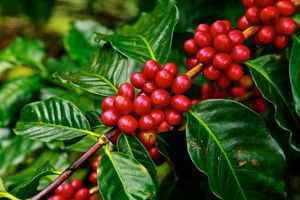
Cultivating Perfection
Grown for Greatness
Specialty Coffee thrives in specific climates and geographies, often referred to as the "Coffee Belt" — regions between the Tropics of Cancer and Capricorn.
Key factors include:
Altitude: Most specialty coffees are grown at high elevations, typically between 1,200 and 2,000 meters (4,000–6,500 feet) above sea level. Higher altitudes slow the growth of coffee cherries, allowing more time for complex sugars and flavors to develop in the beans.
Climate: A balance of warm days (around 18–24°C or 65–75°F) and cool nights is ideal, along with consistent rainfall (1,500–2,000 mm annually). Too much heat or drought can stress the plants, while excessive rain can dilute flavors.
Soil: Volcanic soils rich in organic matter, nitrogen, and minerals (like those in Colombia or Hawaii) are preferred. Good drainage is critical to prevent root rot, but the soil must retain enough moisture to nourish the coffee trees.
Shade: Many specialty coffee farms use shade-grown methods, planting coffee under a canopy of native trees. This mimics the plant’s natural habitat (coffee originated as an understory shrub in Ethiopia) and enhances flavor complexity while protecting against overexposure to sun.
Varieties: Specialty Coffee often comes from specific cultivars of Coffea arabica (which makes up 60–70% of global coffee production), such as Typica, Bourbon, Geisha, or SL-28. These heirloom varieties are prized for their unique flavor profiles but are more delicate and less disease-resistant than robusta or hybrid strains.
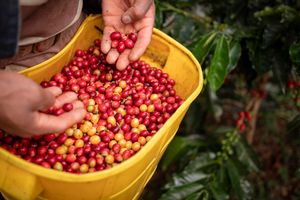
Handpicked to be Special
When it Comes to Coffee, Pickiness Pays Off
Specialty Coffee demands selective hand-picking to ensure only ripe cherries are harvested:
Timing: Coffee cherries ripen at different rates, even on the same branch. Harvest typically occurs once a year (though some regions like Colombia have two seasons). Skilled pickers return multiple times over weeks to collect only the reddest, ripest cherries, leaving green ones to mature.
Labor: This is the most labor-intensive step. A picker might harvest 50–100 pounds of cherries daily, yielding just 10–20 pounds of green coffee beans after processing. For context, a single pound of roasted Specialty Coffee might require picking 4,000–5,000 cherries!
Quality Check: Farmers or cooperatives often sort cherries immediately after picking to remove defects (underripe, overripe, or damaged fruit).
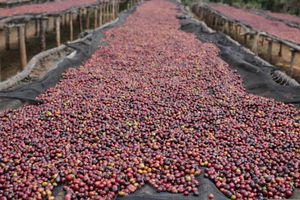
Processed to be Superb
Dialing it in and Locking it Down
Processing methods can have a profound effect on coffee flavor. Once fully processed, taste-tested, bagged and exported, the inherent flavors are locked in, waiting to be released in the roasting process.
Washed (Wet) Process: Cherries are pulped to remove the outer skin, then fermented in water tanks for 12–48 hours to break down the mucilage (a sticky layer around the bean).Beans are washed and dried on raised beds or patios until moisture content reaches 10–12%. Result: Cleaner, brighter flavors with higher acidity.
Natural (Dry) Process: Whole cherries are dried in the sun for 2–4 weeks, turned regularly to prevent mold. Once dry, the husk is mechanically removed to reveal the bean. Result: Sweeter, fruitier, and heavier-bodied coffees
Honey (Semi-Washed) Process: Skin is removed, but some mucilage is left on during drying, creating a hybrid of washed and natural traits. Result: Balanced sweetness and acidity (popular in Costa Rica).
Drying and Milling
Drying: Beans are dried to a precise moisture level (10–12%) to prevent spoilage while preserving flavor. This can take 7–20 days depending on weather and method (sun-dried or mechanical).
Hulling: Dried parchment (a protective layer) is removed, revealing the green bean.
Sorting: Beans are sorted by size, density, and color, often by hand or machine (e.g., using air blowers or water channels). Defects like broken or discolored beans are discarded to meet specialty standards.
Cupping and Grading
Cupping: Trained tasters (Q Graders) evaluate samples for aroma, taste, and defects, evaluating them based on standards developed by the SCA (Specialty Coffee Association). Coffees that score from 80 - 100 points and have no primary defects can qualify as Specialty Coffee.
For more information on how graders evaluate coffees, visit the the SCA website at: https://sca.coffee/research/what-is-specialty-coffee
https://sca.coffee/value-assessment
Export: Beans are then packed in burlap or GrainPro bags to maintain freshness and shipped to importers and roasters worldwide.
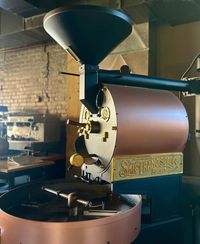
The Artisan Roaster
Releasing "the Special" Within
The task of the Artisan Coffee Roaster is to release the unique, desirable flavors inherent within the coffee bean. To do so, we roast in small batches using time-tested, Old School, artisan techniques. We use time, temperature, air flow, aroma, sight and sound to bring out the best in each coffee that we roast. And we're hands-on every step of the way so there are no computers between the roaster (us) and your coffee.
Specialty Coffee roasters aim to reveal the inherent qualities of the bean—its terroir, varietal, and processing method. Specialty roasting seeks to highlight nuance: floral notes, fruit acidity, chocolate undertones, or earthy spice. The goal isn’t to impose a flavor (as commercial roasters often do) but to coax out what’s already there, treating each batch as a unique expression of its origin.
Unlike Commodity and most Commercial roasting, where consistency and cost drive mass production, Specialty Roasting is about experimentation and expression. Roasters taste (or “cup”) samples repeatedly, tweaking profiles to coax out a bean’s potential—say, the blueberry jam notes of a natural Ethiopian or the silky mouthfeel of a washed Costa Rican. It’s a dialogue between the bean’s origin, the roaster’s skill, and the drinker’s palate.
In short, roasting fine Specialty Coffee is a meticulous dance of heat and timing, aiming to honor the bean’s story rather than overpower it. The result? A cup that’s as much a craft as the roasting itself.
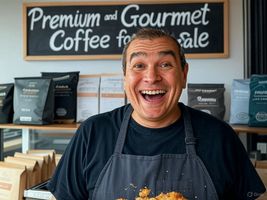
Premium, Gourmet or Specialty, What's the Difference?
Sometimes a Name is Just a Name
There are a "gozillion" (to quote Forrest Gump) coffee companies in America and probably twice as many coffee advertising and marketing executives. Their goal is to convince you that their coffee is "special."
They do so by using words that sound impressive, but mean little to nothing.
Premium Coffee
Take the worda Premium Coffee. Advertisers use this term a lot but, in reality, there is no such thing as a Premium Grade of coffee. Within the coffee industry, there is Specialty Coffee, Commercial Coffee, and Commodity Coffee which is, ultimately, a subset of Commercial Coffee.
So what is Premium Coffee and what are Premium coffee beans?
The answer is, no one really knows. They can mean whatever the coffee advertiser decides they mean because there are no objective, measurable standards for something called Premium Coffee!
The same is true of Gourmet Coffee. The grim reality is that these words are purely marketing terms that have no definitive meanings and point to no objective standards within the coffee industry.
In effect, if a coffee company says that they offer Premium or Gourmet Coffee, this is a statement of opinion - THEIRS.
They may make the case that they use premium or gourmet coffee beans, but these words by themselves mean nothing - not to the coffee lovers among us or to the Coffee Industry at large.
Specialty Coffee
Specialty Coffee stands far above these gimmicky, marketing terms because it has a very well-defined, objective meaning with measurable standards that range from the cultivation of the crop all the way to the brim of the cup. In short, the term Specialty Coffee actually means something.
This is what we roast and this is the product that we are intensely proud of. We are Specialty Roasters roasting Specialty Coffee for those truly special people who understand that coffee is not just a caffeine delivery system. It's not just a morning wake-up or an afternoon pick-me-up.
Instead, it is one of life's great pleasures to be anticipated, savored and enjoyed. In our view, we see great coffee as one of the many gifts that God has bestowed upon mankind purely for our enjoyment. And what a gift it is.
